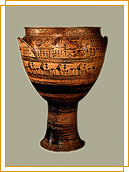Homeric Age
The two Homeric epics, Iliad and Odyssey, which were written during the Geometric period (8th-7th century BC), provide a full description of all athletic events, as they were known in that period: chariot races, boxing, wrestling, running, armor fighting, discus, archery and javelin.  Although they
reflect the customs of the Mycenean period that had been preserved
by tradition, these specific epics also describe the customs and
values of the upper classes of the Geometric period. Although they
reflect the customs of the Mycenean period that had been preserved
by tradition, these specific epics also describe the customs and
values of the upper classes of the Geometric period.
In the Iliad there is extensive reference to the funerary games organized by Achilles in order to honor his dear dead friend, Patroclus. In the Odyssey the games were conducted quite differently, as part of an entertaining spectacle organized by the Phaeacians in honor of their guest Odysseus when he arrived on their island.
In the Homeric society, athletic excellence was the means for the hero to demonstrate his virtue and achieve social recognition. With exercise and competition he proves not only his physical prowess but also his bravery and intelligence, and as a consequence his virtue:
"Ah, well, sir, I would not put you down as a fellow who goes in for games ...
(Homer, Odyssey VIII, translated by W.H.D. Rouse)
These are the words of Euryalus to Odysseus and he, feeling insulted and humiliated, asserts his superiority in discus throwing.
In many respects, the athletic spirit is equivalent with the heroic spirit. Every hero is like an athlete who tries to overcome his opponents and be the winner. The society of that period respected the athletes who exercised to prove their superiority, as shown by the Phaeacians, who rewarded Odysseus by recognising his worth in public. Virtue and social recognition were the most important aspects of the athlete's identity during the Homeric years.
|
